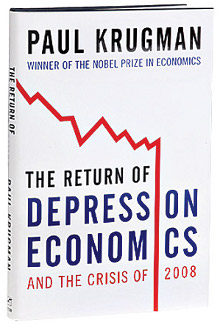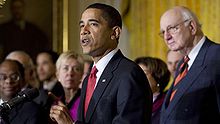Keynesian economics are the various macroeconomic theories and models of how aggregate demand strongly influences economic output and inflation. In the Keynesian view, aggregate demand does not necessarily equal the productive capacity of the economy. It is influenced by a host of factors that sometimes behave erratically and impact production, employment, and inflation.

John Maynard Keynes, 1st Baron Keynes, was an English economist and philosopher whose ideas fundamentally changed the theory and practice of macroeconomics and the economic policies of governments. Originally trained in mathematics, he built on and greatly refined earlier work on the causes of business cycles. One of the most influential economists of the 20th century, he produced writings that are the basis for the school of thought known as Keynesian economics, and its various offshoots. His ideas, reformulated as New Keynesianism, are fundamental to mainstream macroeconomics. He is known as the "father of macroeconomics".
Business cycles are intervals of general expansion followed by recession in economic performance. The changes in economic activity that characterize business cycles have important implications for the welfare of the general population, government institutions, and private sector firms.

Paul Robin Krugman is an American New Keynesian economist who is the Distinguished Professor of Economics at the Graduate Center of the City University of New York. He was a columnist for The New York Times from 2000 to 2024. In 2008, Krugman was the sole winner of the Nobel Memorial Prize in Economic Sciences for his contributions to new trade theory and new economic geography. The Prize Committee cited Krugman's work explaining the patterns of international trade and the geographic distribution of economic activity, by examining the effects of economies of scale and of consumer preferences for diverse goods and services.
A liquidity trap is a situation, described in Keynesian economics, in which, "after the rate of interest has fallen to a certain level, liquidity preference may become virtually absolute in the sense that almost everyone prefers holding cash rather than holding a debt which yields so low a rate of interest."

In economic policy, austerity is a set of political-economic policies that aim to reduce government budget deficits through spending cuts, tax increases, or a combination of both. There are three primary types of austerity measures: higher taxes to fund spending, raising taxes while cutting spending, and lower taxes and lower government spending. Austerity measures are often used by governments that find it difficult to borrow or meet their existing obligations to pay back loans. The measures are meant to reduce the budget deficit by bringing government revenues closer to expenditures. Proponents of these measures state that this reduces the amount of borrowing required and may also demonstrate a government's fiscal discipline to creditors and credit rating agencies and make borrowing easier and cheaper as a result.

Kenneth Saul Rogoff is an American economist and chess Grandmaster.
The Austrian business cycle theory (ABCT) is an economic theory developed by the Austrian School of economics seeking to explain how business cycles occur. The theory views business cycles as the consequence of excessive growth in bank credit due to artificially low interest rates set by a central bank or fractional reserve banks. The Austrian business cycle theory originated in the work of Austrian School economists Ludwig von Mises and Friedrich Hayek. Hayek won the Nobel Prize in Economics in 1974 in part for his work on this theory.

The recession of 1937–1938 was an economic downturn that occurred during the Great Depression in the United States.
Economic stagnation is a prolonged period of slow economic growth, usually accompanied by high unemployment. Under some definitions, slow means significantly slower than potential growth as estimated by macroeconomists, even though the growth rate may be nominally higher than in other countries not experiencing economic stagnation.

Russell David "Russ" Roberts is an American-born Israeli economist. He is a research fellow at Stanford University's Hoover Institution and president of Shalem College in Jerusalem. He is known for communicating economic ideas in understandable terms as host of the EconTalk podcast.

The Great Recession was a period of market decline in economies around the world that occurred from late 2007 to mid-2009. The scale and timing of the recession varied from country to country. At the time, the International Monetary Fund (IMF) concluded that it was the most severe economic and financial meltdown since the Great Depression.

Following the global 2007–2008 financial crisis, there was a worldwide resurgence of interest in Keynesian economics among prominent economists and policy makers. This included discussions and implementation of economic policies in accordance with the recommendations made by John Maynard Keynes in response to the Great Depression of the 1930s, most especially fiscal stimulus and expansionary monetary policy.

In macroeconomics, particularly in the history of economic thought, the Treasury view is the assertion that fiscal policy has no effect on the total amount of economic activity and unemployment, even during times of economic recession. This view was most famously advanced in the 1930s by the staff of the British Chancellor of the Exchequer. The position can be characterized as:
Any increase in government spending necessarily crowds out an equal amount of private spending or investment, and thus has no net impact on economic activity.

The Forgotten Man: A New History of the Great Depression is a book by Amity Shlaes published by HarperCollins in 2007. The book is a re-analysis of the events of the Great Depression, generally from a free market perspective. The book criticizes Herbert Hoover and the Smoot-Hawley Tariff as exacerbating the Depression through government intervention. It opines that Franklin D. Roosevelt pursued erratic policies that froze investment and failed to take the steps needed to stop the Depression, and that the New Deal extended the length of the Depression and had deleterious effects on individuals.

In economics, stimulus refers to attempts to use monetary policy or fiscal policy to stimulate the economy. Stimulus can also refer to monetary policies such as lowering interest rates and quantitative easing.

The Return of Depression Economics and the Crisis of 2008 is a non-fiction book by American economist and Nobel Prize winner Paul Krugman, written in response to growing socio-political discourse on the return of economic conditions similar to The Great Depression. The book was first published in 1999 and later updated in 2008 following his Nobel Prize of Economics. The Return of Depression Economics uses Keynesian analysis of past economics crisis, drawing parallels between the 2008 financial crisis and the Great Depression. Krugman challenges orthodox economic notions of restricted government spending, deregulation of markets and the efficient market hypothesis. Krugman offers policy recommendations for the prevention of future financial crises and suggests that policymakers "relearn the lessons our grandfathers were taught by the Great Depression" and prop up spending and enable broader access to credit.

The New New Deal: The Hidden Story of Change in the Obama Era is a 2012 book about the Obama administration and its response to the world financial crisis written by journalist Michael Grunwald. He describes the discussions and debates that led to the government's anti-recession measures such as the American Recovery and Reinvestment Act of 2009 (ARRA). Taking a positive review of the President's efforts, Grunwald defends the economic measures as full of important, long-term investments while charging Republican Party opponents as being hypocritical and self-serving. The book was published by Simon & Schuster on August 14, 2012.
In economics, secular stagnation is a condition when there is negligible or no economic growth in a market-based economy. In this context, the term secular means long-term, and is used in contrast to cyclical or short-term. It suggests a change of fundamental dynamics which would play out only in its own time. The concept was originally put forth by Alvin Hansen in 1938. According to The Economist, it was used to "describe what he feared was the fate of the American economy following the Great Depression of the early 1930s: a check to economic progress as investment opportunities were stunted by the closing of the frontier and the collapse of immigration". Warnings of impending secular stagnation have been issued after all deep recessions since the Great Depression, but the hypothesis has remained controversial.

Austerity: The History of a Dangerous Idea is a 2013 book by Mark Blyth that explores the economic policy of austerity. Studying the use of austerity around the world up to the early 2010s and tracing its intellectual lineage, Blyth argues that the case for increasing economic growth through austerity is overstated, is counterproductive when implemented during recessions, and has exacerbated the European debt crisis. Austerity was selected among the Best Books of 2013 in reviews by the Financial Times and Bloomberg News.













